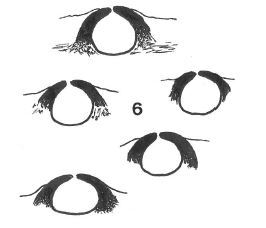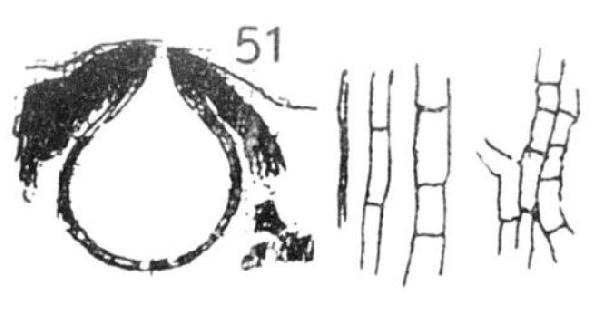Verrucaria pseudovirescens Servít
Preslia, 24: 379, 1952.
Synonyms:
Description: Thallus crustose, episubstratic, areolate, 0.25-0.35 mm thick, dark olive-brown to brown, the areoles 0.5-0.9 mm wide, mostly flat, sometimes partially subdivided into smaller units. Cortex thin, small-celled (the cells 4-5 μm wide); algal layer 100-150 μm thick; medulla white to partially brownish in lower part, filled with substrate particles. Perithecia black, 1-2 per areole, almost completely immersed to 1/3 projecting, the apical part flat to convex, 0.25-0.45 mm wide. Involucrellum reaching down to ½–⅔ of the perithecium, 60-90 μm thick laterally, unsharply delimited and often fringed-eroded in lower part, partially surrounded by brownish medullary tissue; exciple globose, 0.2-0.4 mm across, the wall colourless to brown, c. 15 μm thick; hamathecium of weakly branched and anastomosing, 35-50 μm long periphyses and periphysoids, interascal filaments absent; hymenial gel hemiamyloid, I+ red (I+ blue at very low concentrations of I), K/I+ blue. Asci 8-spored, clavate, I-, fissitunicate, the wall thickened above, with an ocular chamber, dehiscent by extrusion of an endotunica to form a delicate rostrum, Verrucaria-type. Ascospores 1-celled, hyaline, ellipsoid, 17-22 x (7-)8-11 μm. Pycnidia black, small, immersed. Conidia straight or slightly curved, 5-6 x c. 1 μm. Photobiont chlorococcoid. Spot tests: K-, C-, KC-, P-, UV-. Chemistry: without lichen substances.
Growth form: Crustose
Substrata: rocks
Photobiont: green algae other than Trentepohlia
Reproductive strategy: mainly sexual
Poorly known taxon in need of further study
Commonnes-rarity: (info)
Alpine belt: absent
Subalpine belt: absent
Montane belt: absent
Dry submediterranean belt: very rare
Humid submediterranean belt: absent
Padanian area: very rare
pH of the substrata:
1 2 3 4 5
Solar irradiation:
1 2 3 4 5
Aridity:
1 2 3 4 5
Eutrophication:
1 2 3 4 5
Poleotolerance:
0 1 2 3
Altitudinal distribution:
1 2 3 4 5 6
Rarity
absent
extremely rare
very rare
rare
rather rare
rather common
common
very common
extremely common
Loading data...
Occurrence data
Predictive map
Growth form: Crustose
Substrata: rocks
Photobiont: green algae other than Trentepohlia
Reproductive strategy: mainly sexual
Poorly known taxon in need of further study
Commonnes-rarity: (info)
Alpine belt: absent
Subalpine belt: absent
Montane belt: absent
Dry submediterranean belt: very rare
Humid submediterranean belt: absent
Padanian area: very rare
pH of the substrata:
| 1 | 2 | 3 | 4 | 5 |
Solar irradiation:
| 1 | 2 | 3 | 4 | 5 |
Aridity:
| 1 | 2 | 3 | 4 | 5 |
Eutrophication:
| 1 | 2 | 3 | 4 | 5 |
Poleotolerance:
| 0 | 1 | 2 | 3 |
Altitudinal distribution:
| 1 | 2 | 3 | 4 | 5 | 6 |
Rarity
absent
extremely rare
very rare
rare
rather rare
rather common
common
very common
extremely common
Loading data...
Occurrence data
Predictive map








